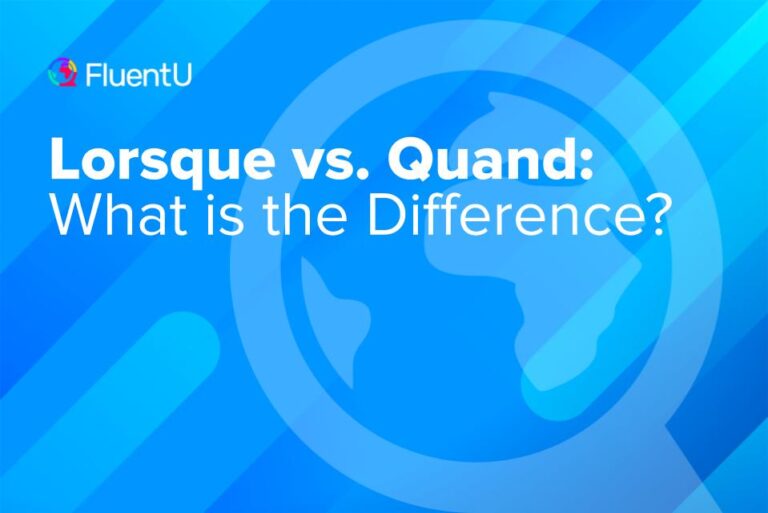Contents
- Most Common Regular -re French Verbs
- Attendre (to wait for)
- Accepter (to accept)
- Aimer (to like)
- Bavarder (to chat)
- Défendre (to defend)
- Dépendre (to depend on)
- Descendre (to descend)
- Détendre (to relax)
- Entendre (to hear)
- Étendre (to stretch)
- Fendre (to split)
- Fondre (to melt)
- Mordre (to bite)
- Pendre (to hang)
- Perdre (to lose)
- Prétendre (to claim)
- Rendre (to return)
- Répandre (to spread, to scatter)
- Répondre (to answer)
- Tendre (to tighten)
- Vendre (to sell)
- What Are Regular -re French Verbs?
- How to Conjugate Regular French -re Verbs
- Resources for Practicing Regular -re French Verbs
- And one more thing...
21 Common Regular -re Verbs in French

As you may know, there are two main types of verbs in French: regular and irregular verbs. Today we’ll look at the most common regular verbs that end in –re.
You’ll learn how to conjugate these verbs and see how to use them in sentences with real-life examples, so you can start using these faithful French action words today.
Download: This blog post is available as a convenient and portable PDF that you can take anywhere. Click here to get a copy. (Download)
Most Common Regular -re French Verbs
Attendre (to wait for)
J’attends le garçon qui porte la chemise bleue.
(I’m waiting for the boy wearing the blue shirt.)
Accepter (to accept)
J’accepte l’invitation à la fête.
(I accept the invitation to the party.)
Aimer (to like)
(She likes chocolate.)
Bavarder (to chat)
Nous bavardons pendant la récréation.
(We chat during the break.)
Défendre (to defend)
Il défend les droits de tous les êtres humains.
(He defends the rights of all humans.)
Dépendre (to depend on)
Je dépends de ma voiture pour aller au travail.
(I depend on my car to go to work.)
Descendre (to descend)
Nous descendons les escaliers lentement.
(We are going down the stairs slowly.)
Détendre (to relax)
Elle se détend en écoutant de la musique.
(She relaxes by listening to music.)
Entendre (to hear)
(We hear a bird.)
Étendre (to stretch)
J’étends le linge sur la corde à linge.
(I am hanging the laundry on the clothesline.)
Fendre (to split)
Il fend le bois avec une hache.
(He splits the wood with an axe.)
Fondre (to melt)
Tu fonds le fromage pour le repas.
(You melt the cheese for the meal.)
Mordre (to bite)
Le chien ne va pas me mordre, n’est-ce pas?
(The dog is not going to bite me, right?)
Pendre (to hang)
Vous pendez votre manteau au cintre.
(You hang your coat on the hanger.)
Perdre (to lose)
Tu perds toujours tes chaussures !
(You always lose your shoes!)
Prétendre (to claim)
Elles prétendent avoir vu l’homme au restaurant.
(They claim to have seen the man at the restaurant.)
Rendre (to return)
Elle rend les livres à la bibliothèque.
(She returns the books to the library.)
Répandre (to spread, to scatter)
Le vent répand les feuilles dans le jardin.
(The wind scatters the leaves in the garden.)
Répondre (to answer)
(They respond to the questions.)
Tendre (to tighten)
Elle tend la main pour l’aider à se relever.
(She reaches out her hand to help him up.)
Vendre (to sell)
Ils vendent des fruits frais au marché.
(They sell fresh fruits at the market.)
What Are Regular -re French Verbs?
Regular verbs are predictable and follow set patterns depending on their endings. This means that all regular verbs that end the same way follow the same conjugation pattern and behave the same way when paired with a subject.
On the other hand, irregular verbs are not predictable and do not follow a set pattern. That means that their forms have to be specially memorized.
In French, there are three “groups” of regular verbs based on the ending of the infinitive (unconjugated) verb:
- The first group of regular verbs includes verbs that end in –er such as parler (to speak) or chanter (to sing).
- The second group includes verbs that end in –ir such as finir (to finish) or grandir (to grow).
- The third group contains verbs ending in –re.
This third group not only includes regular verbs that end in -re, but it also includes all the irregular verbs in the French language.
How to Conjugate Regular French -re Verbs
Let’s learn to conjugate regular French -re verbs with the words vendre (to sell) and descendre (to descend).
Present
First, you need to drop the -re ending to get your verb stem: vend-
It’s to this stem that we add the various endings. In essence, there are only four endings:
- The je and tu forms take -s.
- The nous form takes -ons.
- The vous form takes -ez
- The ils and elles form takes -ent.
Note, however, that regular -re verbs in the present tense do not take an ending with il/elle/on.
Examples:
(I’m selling my car.)
Il descend l’escalier pour chercher les clés.
(He goes down the stairs to look for the keys.)
Compound Past
Creating the past tense in French is a two-step process. First, we need to determine which helper goes with our main verb and then conjugate that verb with the subject. Most verbs take avoir as a helper verb, but a select group of verbs called “Dr. Mrs. Vandertramp” verbs take être.
Secondly, we have to conjugate our main verb into the past participle. If the verb ends in -er like parler (to speak), we drop the -er and add an -é to get parlé. If the verb ends in -ir like finir (to finish), we drop the -ir and add an -i to get fini. If the verb ends in -re like vendre, we drop the -re and add a -u to get vendu.
Now, let’s see these verbs in their past tense. Note: Descendre is a verb that usually takes être as its helper verb, unlike vendre, which takes avoir.
Examples:
J’ai vendu ma vache.
(I sold my cow.)
Il/elle est descendu(e) avec une grosse valise.
(He/she came down with a big suitcase.)
Nous n’avons jamais vendu notre vache.
(We never sold our cow.)
Ils/elles ne sont pas descendu(e)s de la montagne.
(They didn’t descend from the mountain.)
Imperfect
It’s good to note that the stem of regular -re verbs is obtained by removing -ons from the present tense nous conjugation. Then, add the imparfait endings.
Examples:
Je vendais des livres en ligne.
(I used to sell books online.)
Il/elle descendait la colline quand il/elle a vu ma vache!
(He/she was descending the hill when he/she saw my cow!)
Nous vendions des vaches à nos voisins.
(We used to sell cows to our neighbors.)
Simple Future
Like the imparfait, the regular -re verbs in the futur simple take the same endings that other verbs do. However, note that while most other verbs do not drop any letters from their infinitive (unconjugated) forms before adding their endings, regular -re verbs do. They drop their final -e before adding futur simple endings.
Examples:
Je vendrai cent vaches avant la fin de l’année.
(I will sell 100 cows before the end of the year.)
Ils/elles descendront l’escalier avant la fête.
(They will descend the stairs before the party.)
Resources for Practicing Regular -re French Verbs
Once you’ve finished learning all about this group of regulars, come back here to reinforce your knowledge.
You can practice regular -re verbs online at:
- About French: Use this quiz to conjugate two regular -re verbs in the full to make sure you’ve got those endings down pat.
- FluentU. With FluentU, you can see how these types of verbs are used in context by native speakers.
FluentU takes authentic videos—like music videos, movie trailers, news and inspiring talks—and turns them into personalized language learning lessons.
You can try FluentU for free for 2 weeks. Check out the website or download the iOS app or Android app.
P.S. Click here to take advantage of our current sale! (Expires at the end of this month.)
- Lawless French: Review with this handy guide, and then take the quick quiz in the orange box below the post to see how well you’ve understood the group.
- The University of Texas: This quiz tests your ability to conjugate regular -re verbs in a variety of full sentences. When you’re done, use the site’s verb practice program to conjugate -re verbs in all tenses.
And there you have it! See, regular -re verbs are easy as 1-2-3!
Download: This blog post is available as a convenient and portable PDF that you can take anywhere. Click here to get a copy. (Download)
And one more thing...
If you like learning French on your own time and from the comfort of your smart device, then I'd be remiss to not tell you about FluentU.
FluentU has a wide variety of great content, like interviews, documentary excerpts and web series, as you can see here:

FluentU brings native French videos with reach. With interactive captions, you can tap on any word to see an image, definition and useful examples.

For example, if you tap on the word "crois," you'll see this:

Practice and reinforce all the vocabulary you've learned in a given video with learn mode. Swipe left or right to see more examples for the word you’re learning, and play the mini-games found in our dynamic flashcards, like "fill in the blank."

All throughout, FluentU tracks the vocabulary that you’re learning and uses this information to give you a totally personalized experience. It gives you extra practice with difficult words—and reminds you when it’s time to review what you’ve learned.
Start using the FluentU website on your computer or tablet or, better yet, download the FluentU app from the iTunes or Google Play store. Click here to take advantage of our current sale! (Expires at the end of this month.)








